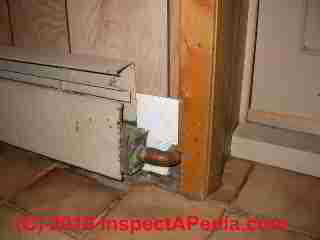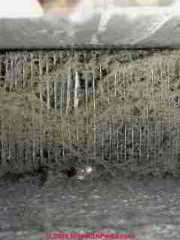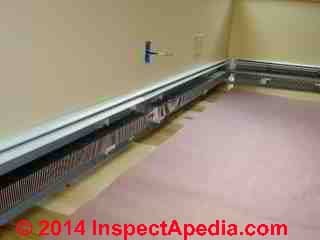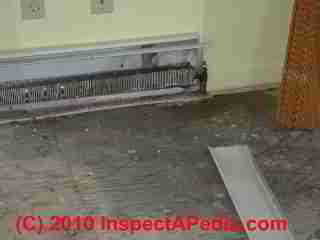 Baseboard Heat Damage
Baseboard Heat Damage
Missing covers, damaged fins, clogged, leaky baseboard heaters
- POST a QUESTION or COMMENT about baseboard heat and heating baseboard installations
Hot water baseboard damage diagnosis & repair.
This article series describes the types of baseboard heat used in buildings and how to inspect, diagnose, and repair problems with baseboard heat.
InspectAPedia tolerates no conflicts of interest. We have no relationship with advertisers, products, or services discussed at this website.
- Daniel Friedman, Publisher/Editor/Author - See WHO ARE WE?
Baseboard Heater Damage Diagnosis & Repair
On 2022/09/05 LB said: - our heater is badly damaged & we want to replace it but we don't know what kind it is
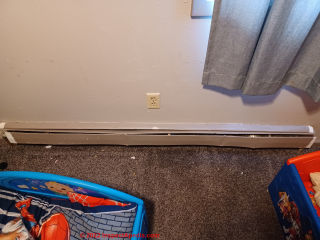 I can't tell from your photo if your heating baseboard is - forced hot water- electric
I can't tell from your photo if your heating baseboard is - forced hot water- electric
I THINK I might see a plumbing fitting at the left end of your baseboard in the photo but the view is so limited I can't be sure. (IF so then it's a hot water baseboard).
And it's usually possible to buy just replacement baseboard heat front covers or louvers from a local plumbing & heating suppliers. The front vertical cover and adjustable louver (if present) simply clip on to support brackets inside the baseboard.
On the other hand if the baseboard fins are badly bent and damaged or if the baseboard pipe itself (if it's hot water) is corroded and leaky, the baseboard needs to be replaced entirely.
But both of those types are easily replaced in sections or rooms - with help from a plumber (hot water baseboard) or an electrician (electrical baseboard heat).
Before going further we need to know what you've got.
Is your home heated by a hot water heating boiler or by electricity?
Look at your wall thermostat: does it say "electric" or "electric heat" - attach a photo.
Tell us the age and location of your building.
If you don't know what kind of heat your building uses, we explain how to figure out the answer
Types of baseboard heat are explained at BASEBOARD HEAT REPAIR
Electric baseboard heat is described at ELECTRIC HEAT
Missing Hot Water Baseboard Heater Covers
These heating baseboard covers are required to assure proper heating of room air by convection. Without the cover, room air will not be directed to flow through the heated fins and piping and the cost of heating the building will be increased as a result: it will take longer to heat the building.
Watch out: exposed baseboard heater fins have sharp edges. In our OPINION these are a child hazard as the delicate skin of children's fingers and hands may be more-easily cut than those of adults.
Exposed baseboard fins are almost always going to be damaged - smashed flat or pushed askew - over the life of the building. This condition also reduces air flow across the baseboard and increases heating cost.
See RADIATOR BASEBOARD or CONVECTOR COVERS for tips on how to make or buy replacement covers for hot water heating baseboards
On 2015-01-13 - by (mod) - how to find replacement covers for heating baseboards
Anon stop by your local heating supplier: there are a number of manufacturers of replacement baseboard covers.
Keep in mind that only the hung-on front cover and possibly the moving louver can be replaced without completely removing all of the baseboards from the walls.
On 2015-01-13 by Anonymous
What to replace old slant fin covers with a third party better looking cover, is this possible? Do you have a line a such company.
Missing Heating Baseboard End Caps
Missing end caps at hydronic (hot water) heating baseboards is both a cosmetic concern and also risks damage to any exposed baseboard fins.
Damaged or Dust-clogged Heating Baseboard Fins
Bent damaged baseboard heater fins or missing fins or fins clogged with dust such as shown in our photo reduces air-flow and thus heating output.
It's easy to fix this problem by careful vacuuming of the heating baseboard fins using a brush attachment or to get under the baseboard and along the floor-wall intersection, use the crevice tool on your home vacuum cleaner.
Watch out: be gentle or use a special brush attachment when vacuuming heating baseboard tubing and fins, or remove the baseboard covers if necessary.
If you are heavy-handed with the vacuum cleaner you may bend and damage the fins covering the baseboard tubing, resulting in reduced heat output.
On 2021-06-12 by inspectapedia.com.moderator - heating baseboard cleaning and maintenance
@Beverly,
The article above, which you might want to read, includes, among other advice about heating baseboard cleaning and maintenance,.
Watch out: be gentle or use a special brush attachment when vacuuming heating baseboard tubing and fins, or remove the baseboard covers if necessary.
If you are heavy-handed with the vacuum cleaner you may bend and damage the fins covering the baseboard tubing, resulting in reduced heat output.
On 2021-06-12 by Beverly
I have baseboard heating using oil for fuel, how often do the baseboards need to be cleaned and how can it be done.
They have not been cleaner for quite a while and I would like to improve t he quality of the air and the efficiency of the heating system.
Who would I contact to clean baseboards in the entire house, which is ten rooms.
Leaks in Hot Water Baseboard
Leaks occur in baseboard heaters most-often at connections, air bleeders, elbows and occasinally in along the baseboard heater piping itself. You'll want to repair leaks immediately to avoid both building damage and loss of heat.
But some leak diagnosis is in order first.
If the leak is at an air bleeder or threaded fitting usuallly that's an easy repair. We may need to replace the air bleeder or to have a plumber re-make threaded fittings with new pipe sealant.
If the leak is at a soldered joint such as an elbow connecting copper baseboard pipes or tubing, while a temporary epoxy repair can work, you'll want a proper re-solder repair by an experienced plumber or baseboard heat installer. The down-side is that to make this repair it will be necessary to turn off the heating system, cool it down, drain it sufficiently to sol
See LEAKS at BASEBOARD, CONVECTOR, RADIATOR for details.
...
Reader Comments, Questions & Answers About The Article Above
Below you will find questions and answers previously posted on this page at its page bottom reader comment box.
Reader Q&A - also see RECOMMENDED ARTICLES & FAQs
On 2023-03-09 by InspectApedia Publisher - damaged and dirty baseboards can be a hazard
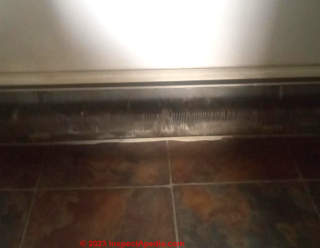 @Courtney
@Courtney
The easy things you can do include
- vacuum off the dirty dusty heating baseboards
- prevent small children from sticking fingers into baseboards where their front covers are missing - by blocking with
furniture or by installing either a proper metal cover (they just snap on) or a makeshift one - a simple board on edge, taped or screwed in place.
About removing these baseboard heaters, it is not reasonable for you to try to remove the baseboards yourself in a rental property.
The piping will be filled with nasty water - the whole system would have to be drained first. And we don't know the condition of the boiler nor whether or not the building owner wants it to be kept in reserve as a possible future heating source.
About when the baseboards were "inspected" - that's not pertinent to the present conditions.
About whether or not it's legal for the landlord to provide no central air nor central heating, the rental property laws that pertain depend on the country and city where you live. Often a landlord is required to provide heating and cooling - depending on the climate zone.
About contacting you, I must send my regrets that our workload as well as the urgency of your situation preclude telephone consulting, whether pro-bono or paid, concerning the question(s) that you have raised.
Depending on where you live, there may be a legal aid office who provide legal advice and support for renters.
Do keep us posted.
On 2023-03-09 by RE-posted from private email (mod) - landlord issues contribute to heating problems
@InspectApedia Editor ,
Hello yes I'm having some difficulties with my landlord she has these very very old baseboard heaters the ones that they have the all the contamination and things like that every time I pull one up it states something like that
anyway I asked her if we could remove them from the home and she acted like of course not but they're truly a hazard
I have two children two and a 3 year old and I don't know why she doesn't want to have a removed and she's already cut the propane off where we can't even use it at central air and heat thank you please contact me ...
I would love to know when they were inspected
and also is it legal for her to have me in here with no central air heat
and then I think there's no window at all in the living room or anything it is really nowhere to put an air conditioner at that time so okay thank you so much
On 2023-03-08 by InspectApedia Editor
@Courtney,
It looks as if the covers are missing and the fins are bent and damaged.
There is a child hazard: those fins are sharp and can cut little fingers.
But the larger issues are what we've already discussed.
On 2023-03-08 by InspectApedia Editor
@Courtney,
Apologies but I don't understand all of your question.
EG: "you cut the propane out of the baseboard heaters" - doesn't mean anything to me. Baseboard heat, that is hot water baseboards or electric baseboards - do not contain propane, nor do I understand how a tenant would "cut propane out of heaters".
Hot water baseboard heat is made of metal: steel covers + copper pipes + aluminum fins through which hot water is circulated. Indeed they can be damaged or dirty so that air flow is obstructed. Do take a look at the article above on this page.
But if your baseboard heat is "off" because the heating boiler that supplies hot water is "off" that's a completely different matter.
It sounds as if the heating boiler for your home is a propane fueled boiler. It may indeed be shut down as unsafe. The "fix" is to have the boiler inspected, cleaned, serviced, repaired as needed and returned to service by a qualified, trained heating service technician.
Or the technician might find that the boiler is beyond economical repair and needs replacement.
You don't give country and city of location, but in most countries even the most basic rental lease requires the landlord to provide safe, habitable space along with heat and hot water.
On 2023-03-08 by Courtney - baseboard heaters don't work in rental
 Yes I don't know how old these baseboards are there when I moved in this house they were filthy disgusting and my landlord said that all of the central heat is cut off because you cut the propane out of the baseboard heaters
Yes I don't know how old these baseboards are there when I moved in this house they were filthy disgusting and my landlord said that all of the central heat is cut off because you cut the propane out of the baseboard heaters
but I burned firewood and stuff because like they have no other heat she informs me but they're old they're moldy they're just nasty they're broken they're all over the house
and I was wanting to know what the fire code is or what any code is of having something like this in your house hooked up or not hooked up
and see if she was supposed to have these removed because all they do is collect dust and they're not even working so why are they in the house she had it cut the propane lines and it's a fire hazard like I said or a child hazard
I have a two and three year old and they're falling all the time plus like I said these things are nasty and I don't know what year she had these put in but I know that they've got to be older and I would love to be able to find out he said it somewhere thank you
On 2015-02-13 by (mod) - solvent odor & noisy baseboard heat diagnosis & repair
First let's discuss baseboard heat noises of which these are the two main sorts:
Normal noise includes thermal expansion when the heating system is first coming on and the baseboards are heating up.
See details at THERMAL EXPANSION of MATERIALS
Air bubbling noises or running water noises, however, tell us that there is air in the hot water piping system: either air bleeders are not working or are missing, or someone worked on the system recently and didn't successfully bleed out un-wanted air from the boiler and piping. The risk is loss of heat.
See details at AIRBOUND HEAT SYSTEM REPAIR by WATER FEED VALVE
About solvent odors at baseboard heaters, there are some different diagnostic steps for you to take
- First, inspect the baseboard heat system for leaks. Hot water heating system water is often smelly and may also have chemical odors if chemical treatments have been added to the system.
- Second, if there are no leaks, the the "solvent odor" is probably coming from somewhere else: a nearby chemical spill or chemical applied to surfaces in the building, or possibly from the heating of painted or varnished surfaces.
On 2015-02-13 by ChicagoCatt - smell strong solvent odor & noisy baseboard heat
I actually have 2 questions for you.
I've been living in a garden apartment in a 1950s building in suburban Chicago since September. The building has baseboard heat. When I first turned on the heat in the late fall there didn't seem to be any issues.
In December, new building owners/landlord changed our thermostat and have since been doing a lot of work on the building mechanicals, but not the individual units. Since late January, whenever the heat turns on, I smell a strong solvent-like odor.
It slowly dissipates as the cycle runs, but returns again when the system kicks back on and it is making me sick with headaches and nausea. This is only in 2 (living room and bedroom) of the 4 rooms that have the baseboard heaters (both on the same outside wall of the building).
The other 2 do not produce this odor (kitchen is on a different external wall and bathroom is separate internal wall). The (new) landlord doesn't have any suggestions for me on what might be causing this or how to resolve it. Do you have any thoughts on what this might be?
Question 2: The last 2 days, I have also been noticing a lot of water noise from all of the units and (my bathroom wall is shared with the mechanical room) boiler.
Last night it actually sounding like a swimming party in the boiler and like I have water features installed for the sound (or I live in an aquarium store). My temperature does not seem to be impacted. Do I need to worry about this? Should I call the landlord to report a problem?
Thank you for any direction you can provide!
...
Continue reading at COLD HEATING RADIATOR REPAIR (hot water / hydronic heat) or select a topic from the closely-related articles below, or see the complete ARTICLE INDEX.
Or see these
Recommended Articles
- AIR BLEEDER VALVES - how to find and operate those cute little controls on baseboards (or radiators)
- AIR-BOUND HEATING SYSTEMS - no heat because air is trapped in piping
- BASEBOARD HEAT REPAIR - home
- AIR-BOUND HEATING SYSTEMS
- BASEBOARD HEAT DAMAGE REPAIR
- COLD HEATING RADIATOR REPAIR (hot water / hydronic heat)
- LEAKS at BASEBOARD, CONVECTOR, RADIATOR
- DIAGNOSE & FIX HEATING PROBLEMS-BOILER - if the boiler is just not working like it should
- ELECTRIC HEAT - home
- NO HEAT - BOILER
Suggested citation for this web page
BASEBOARD HEAT DAMAGE REPAIR at InspectApedia.com - online encyclopedia of building & environmental inspection, testing, diagnosis, repair, & problem prevention advice.
Or see this
INDEX to RELATED ARTICLES: ARTICLE INDEX to HEATING BOILERS
Or use the SEARCH BOX found below to Ask a Question or Search InspectApedia
Ask a Question or Search InspectApedia
Try the search box just below, or if you prefer, post a question or comment in the Comments box below and we will respond promptly.
Search the InspectApedia website
Note: appearance of your Comment below may be delayed: if your comment contains an image, photograph, web link, or text that looks to the software as if it might be a web link, your posting will appear after it has been approved by a moderator. Apologies for the delay.
Only one image can be added per comment but you can post as many comments, and therefore images, as you like.
You will not receive a notification when a response to your question has been posted.
Please bookmark this page to make it easy for you to check back for our response.
IF above you see "Comment Form is loading comments..." then COMMENT BOX - countable.ca / bawkbox.com IS NOT WORKING.
In any case you are welcome to send an email directly to us at InspectApedia.com at editor@inspectApedia.com
We'll reply to you directly. Please help us help you by noting, in your email, the URL of the InspectApedia page where you wanted to comment.
Citations & References
In addition to any citations in the article above, a full list is available on request.
- Mark Cramer Inspection Services Mark Cramer, Tampa Florida, Mr. Cramer is a past president of ASHI, the American Society of Home Inspectors and is a Florida home inspector and home inspection educator. Mr. Cramer serves on the ASHI Home Inspection Standards. Contact Mark Cramer at: 727-595-4211 mark@BestTampaInspector.com
- John Cranor [Website: /www.house-whisperer.com ] is an ASHI member and a home inspector (The House Whisperer) is located in Glen Allen, VA 23060. He is also a contributor to InspectApedia.com in several technical areas such as plumbing and appliances (dryer vents). Contact Mr. Cranor at 804-873-8534 or by Email: johncranor@verizon.net
- Eric Galow, Galow Homes, Lagrangeville, NY. Mr. Galow can be reached by email: ericgalow@gmail.com or by telephone: 914-474-6613. Mr. Galow specializes in residential construction including both new homes and repairs, renovations, and additions.
- Our recommended books about building & mechanical systems design, inspection, problem diagnosis, and repair, and about indoor environment and IAQ testing, diagnosis, and cleanup are at the InspectAPedia Bookstore. Also see our Book Reviews - InspectAPedia.
- Carbon Monoxide Gas Toxicity, exposure limits, poisoning symptoms, and inspecting buildings for CO hazards
- DUST, HVAC CONTAMINATION STUDY An Investigation of Indoor Dust Debris Blamed on a Heating/Cooling System Reveals Carpet Dust
- "Residential Hydronic (circulating hot water) Heating Systems", Instructional Technologies Institute, Inc., 145 "D" Grassy Plain St., Bethel, CT 06801 800/227-1663 [home inspection training material] 1987
- Heating, Ventilating, and Air Conditioning Volume I, Heating Fundamentals,
- Boilers, Boiler Conversions, James E. Brumbaugh, ISBN 0-672-23389-4 (v. 1) Volume II, Oil, Gas, and Coal Burners, Controls, Ducts, Piping, Valves, James E. Brumbaugh, ISBN 0-672-23390-7 (v. 2) Volume III, Radiant Heating, Water Heaters, Ventilation, Air Conditioning, Heat Pumps, Air Cleaners, James E. Brumbaugh, ISBN 0-672-23383-5 (v. 3) or ISBN 0-672-23380-0 (set) Special Sales Director, Macmillan Publishing Co., 866 Third Ave., New York, NY 10022. Macmillan Publishing Co., NY
- Installation Guide for Residential Hydronic Heating Systems
- Installation Guide #200, The Hydronics Institute, 35 Russo Place, Berkeley Heights, NJ 07922
- In addition to citations & references found in this article, see the research citations given at the end of the related articles found at our suggested
CONTINUE READING or RECOMMENDED ARTICLES.
- Carson, Dunlop & Associates Ltd., 120 Carlton Street Suite 407, Toronto ON M5A 4K2. Tel: (416) 964-9415 1-800-268-7070 Email: info@carsondunlop.com. Alan Carson is a past president of ASHI, the American Society of Home Inspectors.
Thanks to Alan Carson and Bob Dunlop, for permission for InspectAPedia to use text excerpts from The HOME REFERENCE BOOK - the Encyclopedia of Homes and to use illustrations from The ILLUSTRATED HOME .
Carson Dunlop Associates provides extensive home inspection education and report writing material. In gratitude we provide links to tsome Carson Dunlop Associates products and services.


